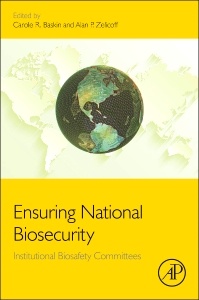Ensuring National Biosecurity Institutional Biosafety Committees
Coordonnateurs : Baskin Carole R, Zelicoff Alan

Ensuring National Biosecurity: Institutional Biosafety Committees reviews the various responsibilities and associated challenges Institutional Biosafety Committees (IBCs) face and proposes changes that may help improve this system and increase national biosecurity and worker safety.
In recent years IBCs in academic and other institutions have been tasked with increasing levels of responsibility, overseeing work with recombinant genetic material and hazardous agents. IBC members often lack the training to effectively ensure that the work performed is truly safe for scientists and the general community, and so increasingly rely upon the expertise of the researchers themselves. With the proposed US dual-use research policies soon to be implemented, this strain may increase. This book provides readers with the necessary information to be able to enhance national biosecurity within the US, EU, Australia, New Zealand, Japan and more.
Ensuring National Biosecurity is as an invaluable reference for biosafety professionals or for researchers who need to understand the regulatory landscape that impacts their research.
1. Laboratory Biosecurity in the United States: Evolution and Regulation 2. U.S. Federal Oversight of Biological Materials and the IBC 3. Challenges With Biocontainment Facilities – Building, Maintaining and Testing 4. Challenges Faced by Senior Administration of Academic Institutions 5. Overcoming Regulatory Gaps in Biological Materials Oversight by Enhancing IBC Protocol Review 6. Dual Use Research 7. Emerging Technologies and Bio-Threats 8. Animal Biosafety 9. Crop Security: Current Priorities and Perspectives in Public Sector Institutional Review 10. Select Agent Program Impact on the IBC 11. Biosecurity Challenges for the IBC: An exploration of the roles and responsibilities of Institutional Biosafety Committees in the age of terrorism and biosecurity, now and for the future 12. IBCs - A Cornerstone of Public Trust in Research 13. Strengthening the Role of the IBC in the 21st Century
- Examines and assesses the current state of Institutional Biosafety Committees (IBCs)
- Collates contributions from world-renowned experts in fields as diverse as research compliance, law and astrobiology
- Reflects an international perspective on regulatory biosecurity and biosafety
Date de parution : 01-2016
Ouvrage de 270 p.
15x22.8 cm
Thème d’Ensuring National Biosecurity :
Mots-clés :
2011 influenza A/H5N1 controversy; BSAT; Bio-threat; Biocontainment facilities; Biohazard; Biological Safety Officer; Biosafety; Biosecurity; Biotechnology; Commissioning; Compliance; Department of Human Health Services; Design; Dual use; Dual use research; Dual use research of concern; Dual use research of concern (DURC); Dual-use research; Emerging infectious diseases; Emerging technologies; Enterprise risk management; Federal regulatory process; Gain-of-function; Genetically modified organism (GMO); High containment; High-consequence pathogens and toxins; Humanized mice; IBC; IBC mandated functions; IBC non-mandated functions; IBC responsibilities; IBC site visit program; Institutional Biosafety Committee; Institutional Biosafety Committee (IBC); Institutional responsibilities; Laboratory biosafety; Large animal; Life sciences; Mitigation strategies; NIH Guidelines; NIH Office of Biotechnology Activities; National Institutes of Health (NIH); National Institutes of Health Guidelines; National Science Advisory Board for Biosecurity (NSABB); Operations; Oversight of dual-use research of concern (DURC); PATRIOT Act; Personnel suitability; Plant pest global disease; Program coordination; Protocol review; Public trust; Publicly funded; RDNA; Recombinant DNA Advisory Committee; Regulatory; Regulatory gaps; Research oversight; Risk assessment; Rule-making; Select Agent program; Select agent; Select agent regulations; Select agents; Testing and performance verification; Transgenic; Viral shedding



